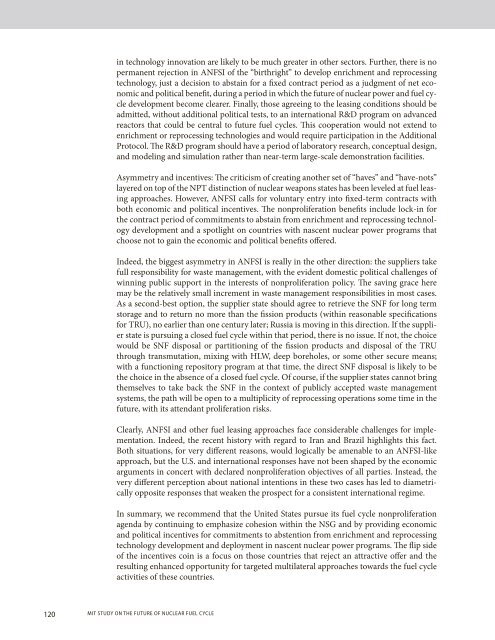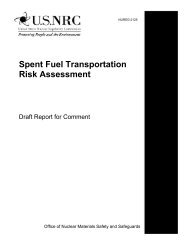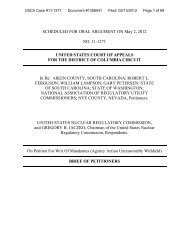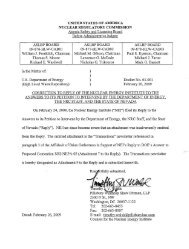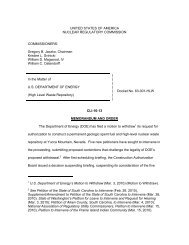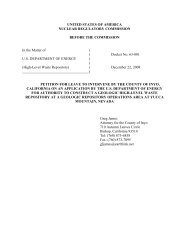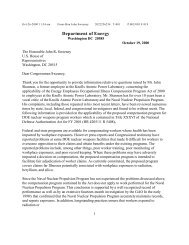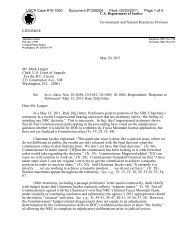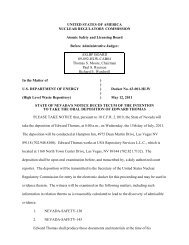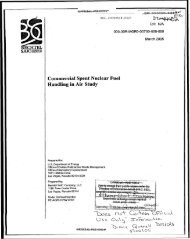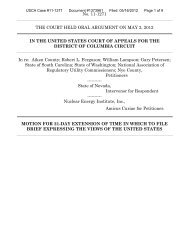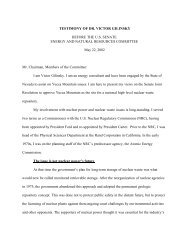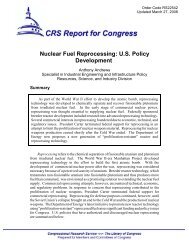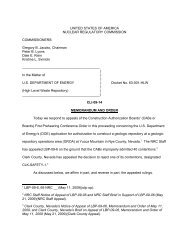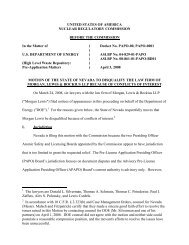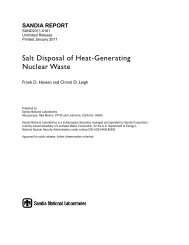The FuTure oF nuclear Fuel cycle - MIT Energy Initiative
The FuTure oF nuclear Fuel cycle - MIT Energy Initiative
The FuTure oF nuclear Fuel cycle - MIT Energy Initiative
Create successful ePaper yourself
Turn your PDF publications into a flip-book with our unique Google optimized e-Paper software.
in technology innovation are likely to be much greater in other sectors. Further, there is no<br />
permanent rejection in ANFSI of the “birthright” to develop enrichment and reprocessing<br />
technology, just a decision to abstain for a fixed contract period as a judgment of net economic<br />
and political benefit, during a period in which the future of <strong>nuclear</strong> power and fuel <strong>cycle</strong><br />
development become clearer. Finally, those agreeing to the leasing conditions should be<br />
admitted, without additional political tests, to an international R&D program on advanced<br />
reactors that could be central to future fuel <strong>cycle</strong>s. This cooperation would not extend to<br />
enrichment or reprocessing technologies and would require participation in the Additional<br />
Protocol. <strong>The</strong> R&D program should have a period of laboratory research, conceptual design,<br />
and modeling and simulation rather than near-term large-scale demonstration facilities.<br />
Asymmetry and incentives: <strong>The</strong> criticism of creating another set of “haves” and “have-nots”<br />
layered on top of the NPT distinction of <strong>nuclear</strong> weapons states has been leveled at fuel leasing<br />
approaches. However, ANFSI calls for voluntary entry into fixed-term contracts with<br />
both economic and political incentives. <strong>The</strong> nonproliferation benefits include lock-in for<br />
the contract period of commitments to abstain from enrichment and reprocessing technology<br />
development and a spotlight on countries with nascent <strong>nuclear</strong> power programs that<br />
choose not to gain the economic and political benefits offered.<br />
Indeed, the biggest asymmetry in ANFSI is really in the other direction: the suppliers take<br />
full responsibility for waste management, with the evident domestic political challenges of<br />
winning public support in the interests of nonproliferation policy. <strong>The</strong> saving grace here<br />
may be the relatively small increment in waste management responsibilities in most cases.<br />
As a second-best option, the supplier state should agree to retrieve the SNF for long term<br />
storage and to return no more than the fission products (within reasonable specifications<br />
for TRU), no earlier than one century later; Russia is moving in this direction. If the supplier<br />
state is pursuing a closed fuel <strong>cycle</strong> within that period, there is no issue. If not, the choice<br />
would be SNF disposal or partitioning of the fission products and disposal of the TRU<br />
through transmutation, mixing with HLW, deep boreholes, or some other secure means;<br />
with a functioning repository program at that time, the direct SNF disposal is likely to be<br />
the choice in the absence of a closed fuel <strong>cycle</strong>. Of course, if the supplier states cannot bring<br />
themselves to take back the SNF in the context of publicly accepted waste management<br />
systems, the path will be open to a multiplicity of reprocessing operations some time in the<br />
future, with its attendant proliferation risks.<br />
Clearly, ANFSI and other fuel leasing approaches face considerable challenges for implementation.<br />
Indeed, the recent history with regard to Iran and Brazil highlights this fact.<br />
Both situations, for very different reasons, would logically be amenable to an ANFSI-like<br />
approach, but the U.S. and international responses have not been shaped by the economic<br />
arguments in concert with declared nonproliferation objectives of all parties. Instead, the<br />
very different perception about national intentions in these two cases has led to diametrically<br />
opposite responses that weaken the prospect for a consistent international regime.<br />
In summary, we recommend that the United States pursue its fuel <strong>cycle</strong> nonproliferation<br />
agenda by continuing to emphasize cohesion within the NSG and by providing economic<br />
and political incentives for commitments to abstention from enrichment and reprocessing<br />
technology development and deployment in nascent <strong>nuclear</strong> power programs. <strong>The</strong> flip side<br />
of the incentives coin is a focus on those countries that reject an attractive offer and the<br />
resulting enhanced opportunity for targeted multilateral approaches towards the fuel <strong>cycle</strong><br />
activities of these countries.<br />
120 <strong>MIT</strong> STudy on <strong>The</strong> <strong>FuTure</strong> <strong>oF</strong> <strong>nuclear</strong> <strong>Fuel</strong> <strong>cycle</strong>


